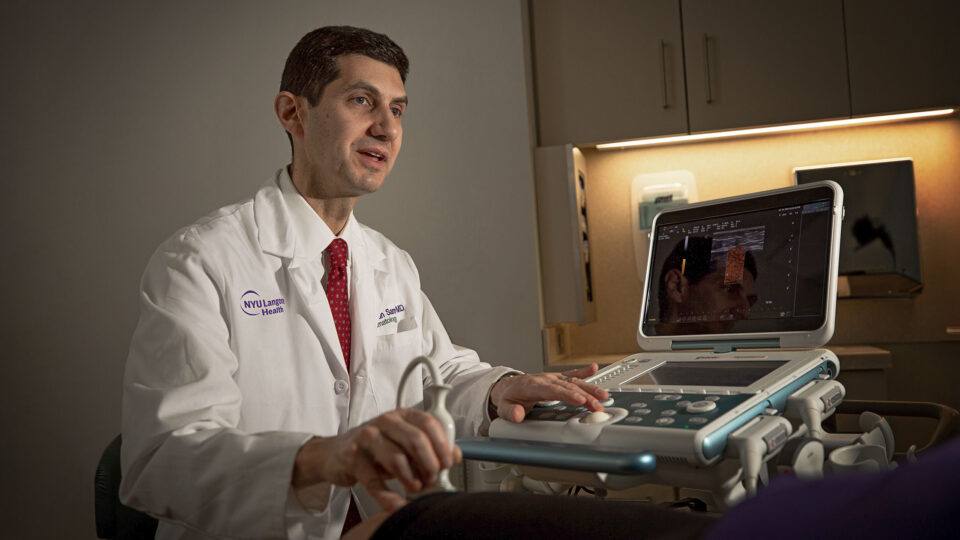Hydroxychloroquine is a mainstay for treating patients with lupus, but long-term use can increase the risk of retinal toxicity. The absence of data on the effects of ending treatment, however, has made this a challenging area for clinical decision-making. While withdrawing the drug after a relatively short-term period in younger patients can increase the risk of lupus flares, any potential impact of withdrawing it after long-term use in older patients remains poorly understood.
Funded by a major new grant from the NIH, researchers at NYU Langone Health will investigate whether discontinuing hydroxychloroquine in older patients deemed clinically stable can be done safely. An earlier NIH planning grant helped the collaborators demonstrate the feasibility of a full clinical trial.
“This all started from listening to our patients and coming up with an idea for testing whether stopping the drug after long-term use had any merit.”
Peter M. Izmirly, MD
“Two of the most common questions that our patients ask are, ‘What are the side effects of this drug?’ and ‘Do I have to take this forever?’” says rheumatologist Peter M. Izmirly, MD, who will serve as a principal investigator along with Jill P. Buyon, MD, the Sir Deryck and Lady Va Maughan Professor of Rheumatology and director of NYU Langone’s Lupus Center.
Ophthalmologists have reported an increase in retinal toxicity among older patients after years of hydroxychloroquine use. “At what point do you say that, potentially, risks could outweigh benefits?” asks Dr. Buyon. The new multisite study, Stopping Hydroxychloroquine in Elderly Lupus Disease, or SHIELD, should fill a significant knowledge gap in the current treatment paradigm.
A Closer Look at Older Patients
Dr. Izmirly, Dr. Buyon, and colleagues began discussing the idea after observing how well many of their older patients were faring.
“Many expressed enthusiasm about the possibility of being weaned from a lifelong course of hydroxychloroquine,” Dr. Izmirly says. “This all started from listening to our patients and coming up with an idea for testing whether stopping the drug after long-term use had any merit.”
The team’s preliminary retrospective data suggested no difference in flare rates between stable patients 55 years or older who stopped taking hydroxychloroquine and those who continued on it. The new placebo-controlled, double-blind trial will offer a more definitive assessment by recruiting about 330 patients who are 60 years or older, have no evidence of active lupus, have taken hydroxychloroquine for at least seven years, and aren’t taking immunosuppressants or high-dose steroids.
“We hope to couple this project with cutting-edge basic science so that we can gain new insights into the immunologic status of older patients with lupus.”
Jill P. Buyon, MD
The study will randomly divide participants into one group that will stay on the drug and a second that will switch to a placebo. Both groups will be followed for one year to assess whether they experience any mild, moderate, or severe flares.
“We hope to couple this project with cutting-edge basic science so that we can gain new insights into the immunologic status of older patients,” Dr. Buyon says. “If patients do flare, we will have a unique opportunity to evaluate potential biomarkers of the flare that have never been looked at in a population of this age.”
Importantly, the trial will include multiple safety mechanisms to ensure that any signal of a lupus flare will trigger a rapid intervention, notes Dr. Izmirly.
Building on a Unique Research Infrastructure
The trial, Dr. Buyon adds, will benefit greatly from the medical center’s wide-reaching lupus program, leveraging its Specimen and Matched Phenotype Linked Evaluation, or SAMPLE, clinical registry, representing a highly diverse patient population of over 1,000 individuals.
“We see patients at three sites, from all walks of life. We’re uniquely positioned to be able to offer this study to patients of all backgrounds,” she says.







